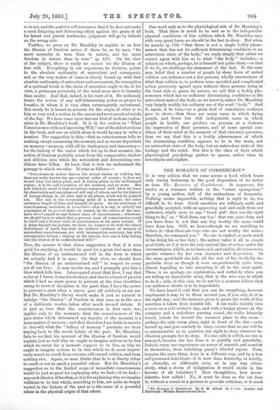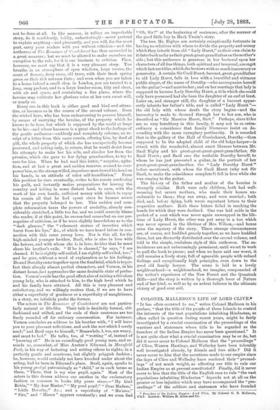THE ROMANCE OF COMBEHURST.*
Iv is very seldom that we come across a book which bears such strong testimony to the good disposition of its writer as does The Romance of Combehurst. It impresses the reader as a romance written in the "sweet spring-time" by a young author, full of the enthusiasm of humanity. Nothing seems impossible, nothing that is right to do, too difficult to be done. Great sacrifices are willingly made and gracefully accepted, with an approving nod and smile from our authoress, which seem to say, "Good girl ! that was the right thing to do," or, "Well done, my boy ! that was your duty, and you have done it, not that any boy worthy the name could have done less. Still, we hear—though we are unwilling to believe it—that there are boys who are not worthy the name ; therefore, we commend you." No one is exalted or made much of for doing his or her duty ; the author takes it all in simple good-faith, as if it were the only natural line of action under the circumstances, which, as we have said, and said in all seriousness, speaks volumes for her own character and disposition. In the same good-faith she tells all the rest of her decidedly im- probable story as though it were unquestionably quite true, almost beguiling us into accepting it all in the same spirit. There is no apology, no explanation, and certainly when you are telling an improbable story, that is the wise way in which to do it ; only, in this case, we do not for a moment believe that our authoress thinks it to be improbable.
We have heard it said that you can do everything, however unpleasant it may be to those around you, if you only do it in the right way ; and the instance given to prove the truth of this assertion is taken from humble life. A cat walks daintily into a room on a cold winter's day, and with a benign glance at the company and a melodious purring sound, she walks leisurely round, selects for herself the warmest place in the room— perhaps the only warm place, right in front of the lire—curls herself up and goes serenely to sleep, secure that no one will be so unreasonable as to question her right to sleep wherever in- clination prompts her to sleep. No one calls it selfish, no one is annoyed, because she has done it so prettily and gracefully-. Indeed, every one experiences an access of warmth and comfort in themselves, from beholding pussy's blissful repose. Now, imagine the same thing done in a different way, and by a less self-possessed individual—if it were done hurriedly, or noisily, or clumsily, or diffidently even, or in any way obtru- sively, what a storm of indignation it would excite in the bosoms of all beholders ? How thoughtless, how incon- siderate, how selfish ! No, it must be done as the cat does it, without a sound or a gesture to provoke criticism, or it must • The ii07/11108 of C,ontbehurst. By E. 3f. Alford. In 2 yols. London and Edinbargb : William Blackwood and Bons. not be done at all. In like manner, in telling an improbable story, do it confidently, boldly, unhesitatingly—never pretend to explain anything—and pleasantly, and you will, for the most part, carry your readers with you without criticism—and the authoress of The Romance of Combehurst has thus succeeded in a great measure ; but we must be allowed to make ourselves an exception to the rule, for it is our business to criticise. First, however, we must say that it is a very pleasant story. You breathe in an atmosphere of open windows, large rooms, the scent of flowers, dewy roses, old trees, with their fresh spring green or their rich autumn tints ; and even when you are taken to a home behind a small shop in London, you are treated to a long, snug parlour, and to a large lumber-room, tidy and clean, with air and space, and containing a fine piano, where the heroine may cultivate her glorious voice at her own sweet will, or nearly so.
Every one in this book is either good and kind and attrac- tive, or becomes so in the course of the second volume. Even the wicked hero, who has been endeavouring to possess himself, by means of marrying the heroine, of the property which he knows to be hers, but which is supposed by the world at large to be his—and whose baseness is a great shock to the feelings of the gentle authoress—suddenly and completely reforms, on re- eeipt of a letter from this same cousin, offering him, by deed of gift, the whole property of which she has unexpectedly become possessed, and asking only, in return, that he would desist from his attempts to make • her his wife, and absolve her from the promise, which she gave to her dying grandmother, to try to care for him. When he had read this letter, "surprise, agita- tion, and at last a great and sudden remorse, seemed to over- power him, as the strong-willed, imperious man bowed his head on his hands, in an attitude of utter self-humiliation." From this position he rises eventually, writes to his cousin confessing his guilt, and instantly makes preparations for leaving the country and toiling in some distant land, to earn, with the work of his own hands, sufficient money with which to repay his cousin all that he had spent since he became aware that the property belonged to her. This sudden and com- plete reformation taxes the powers of credulity, already con- siderably stretched, a little too far, and we could scarcely blame the reader, if at this point, he encroached somewhat on our pre- rogative of criticism, or if he were slightly incredulous as to the "dark glances," the "vehement storms of invective which burst from his lips," &c., of which we have heard before in con- nection with this same young hero. Nor is this all, for the high-minded younger brother, Basil, who is also in love with the heiress, and with whom she is in love, decides that he must share his brother's exile. "If he is shamed," he says, "I am shamed. If he is rightly self-exiled, I am rightly self-exiled, too ;" and he goes, without a word of explanation as to his feelings. He and Dorothy enter together upon the final trial, which is toper- feet their already almost perfect characters, and Vernon, in his distant home, fast approaches the same desirable state of perfec- tion. Vernon's exile has the good effect also of raising a frivolous young lady, who is attached to him, to the high level which he and his family have attained. All this is very pleasant and satisfactory, and we willingly confess that, if we are to have either a superfluity of goodness or a superfluity of naughtiness, in a story, we infinitely prefer the former.
The actors in The Romance of Combehurst are not particu- larly natural or life-like. Their talk is decidedly formal, old- fashioned and stilted, and the ends of their sentences are too finely rounded off for ordinary conversation. For instance, Vernon concludes an address to his brother with, "I will leave you to your pleasant reflections, and seek the rest which I sorely need;" and Basil says to himself, "Meanwhile, I, too, am weary, and must to bed." He talks, too, of " wotting " of, instead of "knowing of." He is an exceedingly good young man, and re- minds us, somewhat, of Alias Austen's Edmund, in Mansfiekl Park, in his way of lecturing and setting others to rights, in a perfectly gentle and courteous, but slightly priggish fashion ; he, however, would certainly not have knocked under about the acting, had he been in Edmund's place. Basil, again, speaks to his young protege patronisingly as "child," or in such terms as these, "There, that is my wise pupil, again." Most of the actors in this drama address one another in the exclamatory fashion so common in books fifty years since,—" My kind Robin," "My dear Master," "My good pupil," "Dear Madam," "Little Dorothy," &c. ; and a superfluity of " Ma'ams," "Sirs," and " Misses " appears constantly ; and we even find
"Oh, Sir !" at the beginning of sentences, after the manner of the good little boy in Mark Twain's story.
The two Mr. Rigbys are certainly exceptionally fortunate in having no relatives with whom to divide the property and money which they inherit from old "Lady Hurst," as their own claim to it dates back as far as their great-great-grandfather on the mother's side ; but this authoress is generous in her bestowal upon her characters of all fine things, both spiritual and temporal, amongst which last are titles, which she bestows with as much inaccuracy as generosity. A certain Sir Cecil Hurst, baronet, great-grandfather to old Lady Hurst, falls in love with a beautiful and virtuous public singer, of the name of Dorothy—who accompanies herself on the guitar !—and marries her; and on her marriage that lady is supposed to become Lady Dorothy Hurst, a title which she could only have possessed had she been the daughter of an earl at least. Later on, and stranger still, the daughter of a baronet appar- ently inherits her father's title, and is called "Lady Hurst "— the old lady with whose death the story begins—and the baronetcy is made to descend through her to her son, who is described as "Sir Maurice Hurst, Bart." Perhaps, since titles are so very hereditary in this family, it may not be so extra- ordinary a coincidence that family likenesses insist on de- scending with the same exemplary pertinacity. It is recorded that in the gallery of the Hall of Combehurst, Dorothy—then supposed to be the adopted child of the old lodge-keeper—is struck with the wonderful, almost exact likeness between Mr. Basil Rigby and his great-great-great-great-grandfather, Sir Basil Hurst ; and Basil sees the veritable Dorothy herself, to whom he has just presented a guitar, in the portrait of her great-great-great-grandmother, the "Lady Dorothy Hurst" before mentioned, with whom Sir Cecil Hurst (why not Sir Basil, to make the coincidence complete ?) fell in love while she was singing to the guitar.
The history of the father and mother of the heroine is strangely similar. Both were only children, both had well- meaning but severe mothers, who made their homes un- endurable to them; they ran away, and were married ; both died, and, before dying, both wrote repentant letters to their respective mothers. Both these letters failed in reaching the hands for which they were destined. One was laid aside in the pocket of a coat which was never again unwrapped in the life- time of Lady Hurst, the other was put away in a box which was never opened in the lifetime of Mrs. Wilson,—and hence arise the mystery" of the story. These strange circumstances are, of course, not huddled grossly together, as we have huddled them, but are discreetly distributed over the second volume, and told in the simple, credulous style of this authoress. The co- incidences are not unbecomingly prominent, until we set to work to pull the book to pieces ; and when we have said our worst, it still remains a lively story, full of agreeable people with refined feelings and exceptionally high principles, even down to the good old family lawyer. The scene is laid in a lovely neighbourhood—a neighbourhood, we imagine, compounded of the writer's experience of the New Forest and the Quantock Hills—and the story is written by a thorough lover of Nature and of her kind, as well as by an ardent believer in the ultimate victory of good over evil.



































 Previous page
Previous page